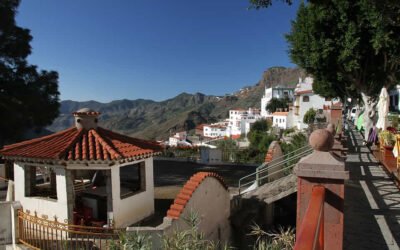Are you considering Central America as your next work and vacation destination?
El Salvador could be just what you’re looking for! This great country, bordered by Guatemala to the northwest, Honduras to the northeast, and the Pacific Ocean to the south, offers an exciting experience for digital nomads, and more especially crypto entrepreneurs and enthusiasts.
Table of Contents
- 1 The visa application
- 2 El Salvadorian Cities that are popular with Digital Nomads
- 3 The Blockchain enterprise and crypto community
- 4 Digital nomad opportunities
- 5 Digital nomad communities
- 6 Popular recreational activities and fun spots
- 7 Transportation
- 8 Security and safety
- 9 The Air Quality
- 10 Cultural and social norms
- 11 Political and economic stability
- 12 Language and language barriers
- 13 Healthcare
- 14 Vaccinations
- 15 Electrical standards
- 16 Telephone and internet plans
- 17 The population of expats
- 18 Payment services infrastructure
- 19 The official currency and exchange rates
- 20 Climate and Seasons
- 21 Popular Cuisines
- 22 Common concerns
In recent years, cities like Santa Ana, San Salvador, and La Libertad have become increasingly popular among remote workers. San Salvador stands out in particular as the capital and largest city. It boasts an affordable cost of living, friendly locals, and reliable internet infrastructure.
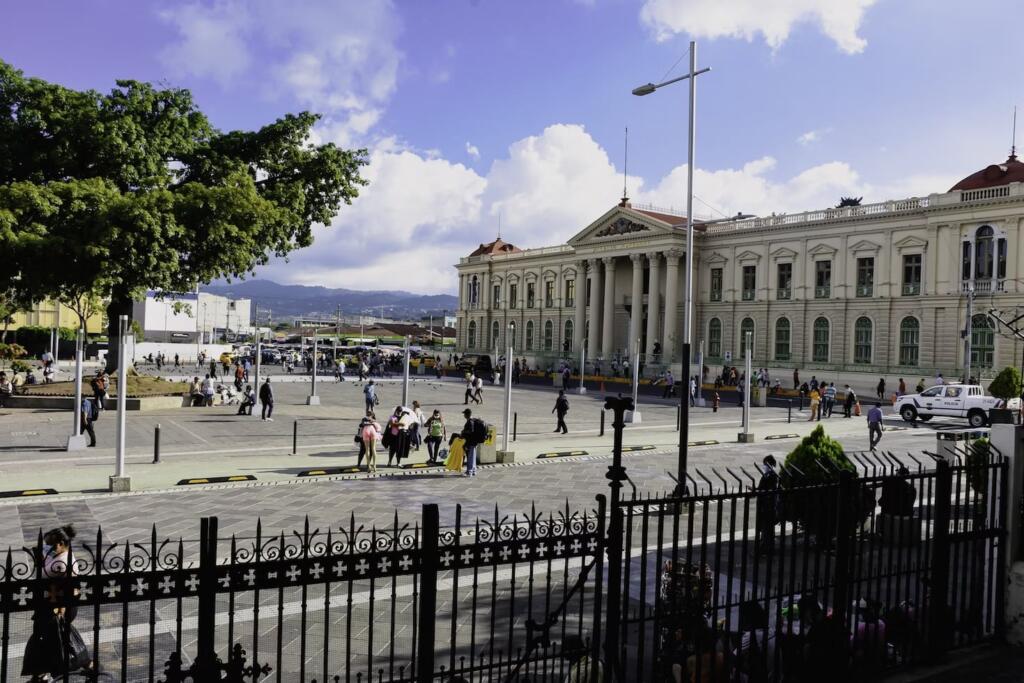
The National Palace San Salvador:
Despite the negative stereotypes surrounding the city, digital nomads have nothing but praise for San Salvador. Nomads who report on Nomad List often rave about the city’s exciting nightlife, free Wi-Fi, and abundance of co-working spaces.
Besides the affordable cost of living, digital nomads love El Salvador for its stunning beaches, friendly locals, and rich culture. The country’s biggest draws also include warm climate, beautiful landscapes, lush rainforests and towering volcanoes. In general, the country has many places to explore and enjoy the great outdoors. Furthermore, its compact size makes it easy to travel around and see everything it has to offer.
If you are a crypto enthusiast, then an El Salvador visit is necessary. Call it a crypto pilgrimage, if you will, and here is the reason.
The government of El Salvador, in September 2021, was the first to recognize Bitcoin as a legal tender and has continued to show unrivaled commitment to promoting the use of cryptocurrency as a means of payment and investment.
The country has set up several programs and initiatives to encourage crypto adoption, including tax incentives for businesses that accept Bitcoin and offering citizenship to foreign investors holding at least 3 Bitcoins.
The visa application
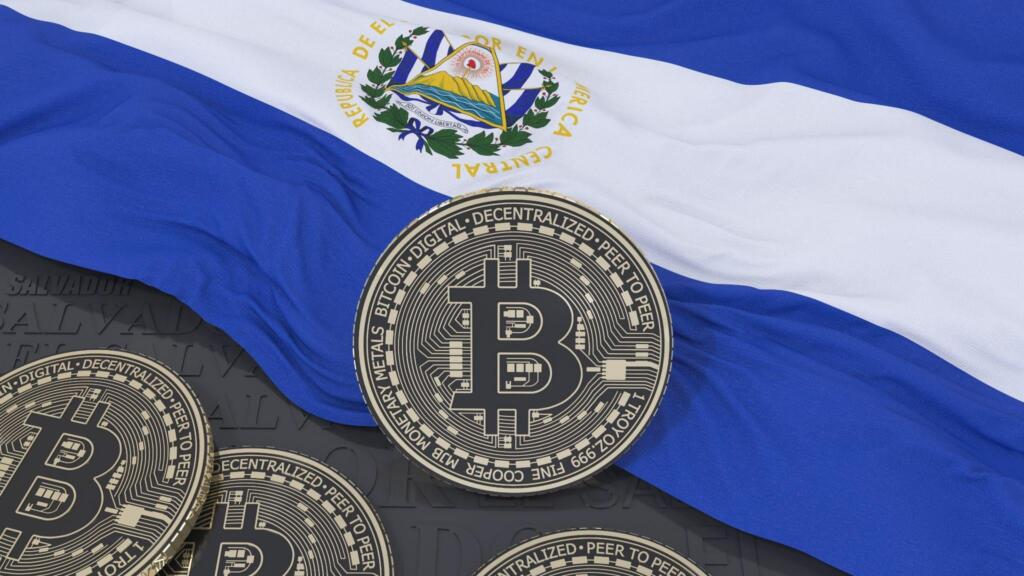
El Salvador is a welcoming nation that invites visitors from around the globe. However, you may need a visa to be allowed in, depending on your nationality and the purpose of your visit. Under the El Salvador Visa Policy, citizens of approximately 90 countries and territories can visit without a visa for a short period, meaning they don’t need to apply for a visa before their travel date.
However, passport holders from around 115 countries must apply for a visa from the embassies or consulate of El Salvador. This can be a single or multiple-entry visa, with a maximum validity of 30, 60, or 90 days for single-entry visas and one year for multiple-entry visas.
The digital nomad visa
Regarding a digital nomad visa, there is currently little evidence from official sources regarding the progress made in that regard. However, plans must be underway to introduce one following the global fascination with digital nomadism.
In the meantime, let’s explore the various visa options for a digital nomad traveling to El Salvador.
The Tourist Visa
The tourist visa is originally for those who plan to visit El Salvador for tourism purposes, such as sightseeing or visiting friends and family. This document is valid for up to 90 days and can be extended for an additional 90 days if necessary. Citizens of some countries, such as Canada , US and the European Union, don’t need a visa to enter El Salvador as tourists.
To apply, you must visit the nearest El Salvador embassy or consulate and submit a visa application along with supporting documents, which may include the following:
- A passport with at least 6 months of validity
- A duly completed application form
- Bank statements as proof of financial means
- Travel Insurance
- Color passport-size photographs (Size 3×4)
- Hotel reservations for the entire stay
- Air tickets to prove your return from the country
- Certificate of good conduct
Other documents may also be required to prove occupation and other details. The processing time for a tourist visa is between 3-10 days, although other factors, including the country from which you are applying, may determine the length of time.
The El Salvador Tourist Visa fee is about 30-45 USD for a single entry, and about The cost of a multiple-entry visa ranges from 50 to 65 USD. However, the fee may vary depending on your citizenry or the country where you submit your application.
The Tourist card
The El Salvador tourist card, also known as the Tarjeta de Turismo, is a mandatory entry requirement for most foreigners traveling to El Salvador for tourism purposes. It is a small, white card that is typically issued upon arrival at the airport or border crossing.
This card is valid for up to 90 days and allows you to enter and exit the country multiple times. Please note that the tourist card is not a visa and, therefore, does not allow visitors to work or conduct business in El Salvador.
To obtain it, you must present a valid passport and proof of plans for further travel, such as a return ticket or a ticket to a third country.
Currently, it costs $12, which can be paid in cash or with a credit card.
You should keep the El Salvador tourist card with you during your stay, as it may be requested by immigration officials when entering or leaving the country. If you lose it, you can obtain a replacement by visiting an immigration office and paying a fee.
The business Visa
The El Salvador Business Visa allows you to enter and stay in El Salvador for business-related activities for the duration of your visa validity. If you’re applying for this visa, you’ll need to provide the following documents,
- Completed application form
- One recent, 3×4 size and color photograph
- Passport and copy of the main page with at least six months validity and 2 blank pages
- National identity card and resident permit/visa copy (if your citizenship and country country of residence are different)
- Travel itinerary, including round-trip air tickets,
- Proof of accommodation and hotel reservation confirmation or invitation letter from the host in El Salvador
- Proof of financial means, such as bank statements for the last six months, salary slips, or other financial documents
- Proof of purpose of visit
- Copy of previously obtained visas
- Travel health insurance
- Proof of professional status, such as an employment contract
- Yellow fever vaccination certificate (required for nationals of countries in South America and Africa, as well as Panama, obtained 15 days prior to the trip)
- If you have a United States, Canada, or Schengen visa, provide a photocopy of it and the passport containing it.
The embassy may ask you to provide additional documents where necessary.
Visa processing time and the average cost
The processing time for the El Salvador Business Visa ranges from 3-10 working days, depending on your visa application country. The visa fee largely depends on your nationality or country of residence, but on average, you may pay 30-45 USD for a single entry. A multiple entry visa may cost you 50-65 USD
You can apply for an El Salvador Business Visa at El Salvador visa application centers, embassies, or consulates that accept visa applications in your country of residence. If none are available in your country, you can apply to the nearest embassy or consulate to your location or region.
Difficulty in the visa application
Applying for a visa can be an intricate process, and it’s not uncommon to encounter difficulties along the way. Here are some common issues that people might face when applying for an El Salvador visa
Lack of information
If you’re unfamiliar with the visa application process or the requirements for obtaining a visa to El Salvador, it can be difficult to know where to start. Research the process thoroughly and gather all the necessary documentation before submitting your application.
Language barrier
If you don’t speak Spanish, the country’s official language, it can be challenging to complete the application and communicate with officials. Consider hiring a translator or using a translation service to help you.
Financial requirements
Some visa categories may require proof of financial means, such as bank statements or employment verification. Ensure you have all the necessary documents to show that you can support yourself in El Salvador.
Criminal record
If you have a record of misconduct, you may face additional hurdles in obtaining a visa to El Salvador. Be honest about your history and provide any relevant documentation that may help your case.
Long processing times
Visa processing times can vary depending on the category of visa and the volume of applications. Be prepared to wait several weeks or even months for your visa to be processed.
If you’re experiencing difficulty with your El Salvador visa application, consider seeking assistance from a qualified immigration attorney or the nearest embassy or consulate of El Salvador. They can guide you through the application process and help you overcome any obstacles.
El Salvadorian Cities that are popular with Digital Nomads
El Salvador boasts of several cities that make it a great digital nomad destination and offers a variety of locations for different lifestyles. For example, San Salvador, the capital city, provides a lively urban experience with great co-working spaces, cafes, and cultural activities.
Meanwhile, Santa Ana city, about 120 kilometers from San Salvador has a relaxed atmosphere and a growing startup enterprise. Further on, about 70 kilometers from Santa Ana is LA Libertad, a coastal town, known for its world-class surf breaks and beachside co-working spaces. And, for those looking for a slower pace of life, Suchitoto, a colonial town in the mountains, offers just that; natural surroundings and opportunities for cultural immersion.
Last but not least, Juayúa, a small town famous for its weekend food festival and picturesque surroundings, is ideal for a weekend getaway.
Let’s discuss some of these cities in greater detail.
San Salvador City
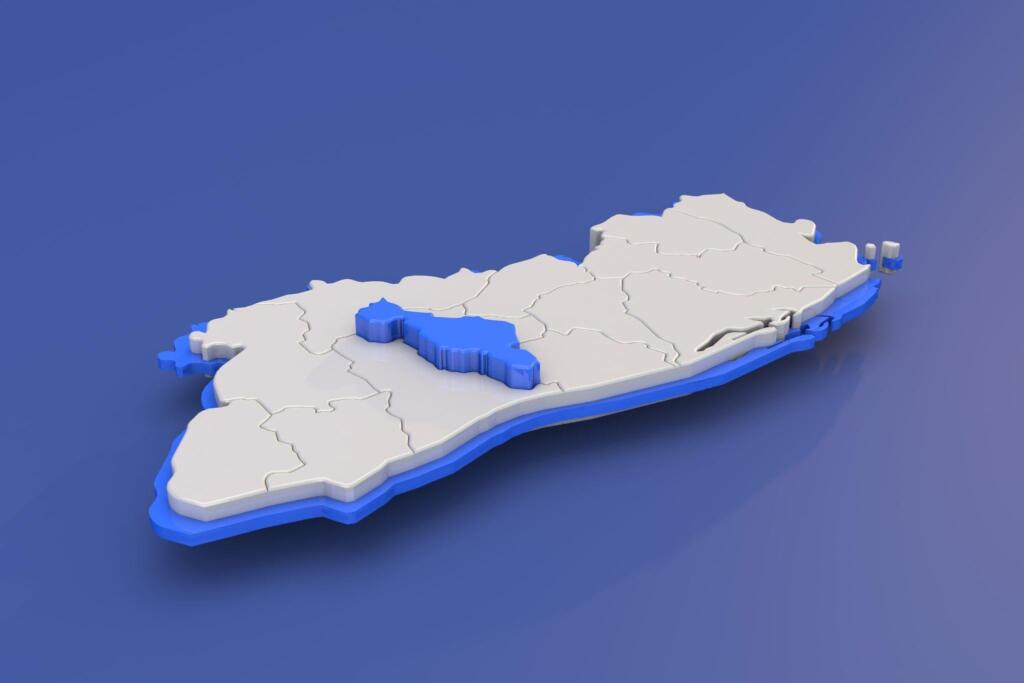
San Salvador is the capital and El Salvador’s largest city right in the country’s central region. The city has a rich and complex history dating back to pre-Columbian times when the indigenous Pipil people inhabited it. In the early 16th century, the Spanish colonized the area and established San Salvador as the capital of the Captaincy General of Guatemala.
San Salvador has experienced significant political and social upheavals throughout its history, including devastating earthquakes, civil wars, and political instability. However, the city has also been a hub of culture, arts, and education, attracting visitors from all over the world.
Today, the city is a bustling metropolis with approximately 240,000 people. As the country’s capital, it is El Salvador’s political, cultural, and economic center. And, like many other metropolitan setups, it boasts a lively arts and music culture. This is evidenced by numerous museums, galleries, restaurants, cafes, and shops.
Many digital nomads agree that the city is a hot tourist destination. According to nomadlist.com, San Salvador has a 9% return rate for visitors, indicating that many people enjoy their time there and choose to come back. Internet speeds in San Salvador are generally good, with average download speeds of around 40 Mbps and upload speeds of 10 Mbps.
There are also several co-working spaces that provide a collaborative and productive environment for entrepreneurs, freelancers, and remote workers to connect and work together.
Cost of living and Cost of living arbitrage
According to data from Numbeo, it would cost approximately $2,822.2 to maintain the same standard of living in San Salvador as it would with $9,100.0 in New York City, assuming you rent in both cities. This means the cost of living in San Salvador is significantly lower than in New York.
In fact, consumer prices in San Salvador are 55.3% lower than in New York, without considering rent. Additionally, the cost of groceries in San Salvador is 57.1% lower than in New York, while restaurant prices are 64.0% lower. When rent is factored in, consumer prices in San Salvador are 69.0% lower than in New York. However, despite the low cost of living, the local purchasing power in San Salvador is 77.1% lower than in New York.
Accommodation
San Salvador boasts a range of accommodation options to suit every budget and preference. Let’s examine a few.
Hotels
San Salvador has a range of hotels to choose from, including luxury hotels, boutique hotels, and budget hotels. Among these are the ;
- Hotel Real Intercontinental San Salvador
- Sheraton Presidente San Salvador Hotel
- Hotel Crowne Plaza San Salvador
Nomad List data shows that the median price for a hotel in San Salvador is $1,380 per month or $65 per night.
Vacation Rentals
If you’re looking for a more private and independent accommodation option, vacation rentals such as apartments or houses are a great option. Many vacation rentals are available in San Salvador on platforms like Airbnb and Vrbo. According to the user feedback on Nomad List, the median price for Airbnb is $1214 per month or $40 per night.
Hostels
For travelers on a budget, hostels are a great option. San Salvador has several hostels that offer comfortable dormitory-style accommodation at affordable rates. Some popular hostels in the city include
- Hostal Cumbres del Volcan
- Hotel Villa Florencia Centro Historico
- Hostal Cumbres del Volcan Flor Blanca
You can find more hostels at hostelworld.com
Guesthouses
Guesthouses are a great option if you are looking for a more intimate and personalized accommodation experience. They are usually smaller than hotels and offer a homely atmosphere. Some popular guesthouses in San Salvador include Hotel Tazumal House and Ximena s Guest House.
Bed and Breakfasts
Bed & breakfasts are a great option for those who want to experience the local culture and cuisine. San Salvador has several bed and breakfast options, such as
Best Neighborhoods for Digital Nomads
The neighborhood you choose to live in can greatly impact your experience living and working abroad. Therefore, carefully considering factors like safety, cost of living, community, and convenience can help you find the best possible living situation for your needs. Here are a few suggestions for your consideration while in San Salvador.
Escalón
This upscale neighborhood is known for its trendy cafes, high-end restaurants, and memorable nightlife experience. It’s also considered one of the safest neighborhoods in the city, with plenty of green spaces and parks for outdoor activities. Escalón has many co-working spaces and is not far from the city center.
Zona Rosa
Zona Rosa is known for its lively bars, nightclubs, and street food vendors. It’s a popular spot for young people and students, and plenty of affordable apartments and co-working spaces are available. Zona Rosa also has some of the best shopping in the city, with everything from high-end boutiques to local street markets.
Colonia San Francisco
Here is another destination for digital nomads seeking a peaceful retreat from the noisy distractions of the city. The serene residential neighborhood offers numerous parks, lush green spaces, and fantastic cafes and restaurants. Furthermore, it boasts excellent connectivity to the rest of the city, thanks to convenient access to public transportation.
Utilities
Based on Numbeo data, the monthly cost of utilities in San Salvador for a basic 85m2 apartment can range from $25.00 to $150.00. This includes electricity, heating, cooling, water, and garbage. The average cost is $68.36 per month.
For prepaid mobile tariff local, the cost for 1 minute is around $0.26, ranging from $0.10 to $0.35. This is relatively affordable compared to other countries.
Internet service is priced at an average of $45.33 per month for a 60 Mbps or more connection with unlimited data and cable/ADSL. The price can range from $30.00 to $80.00, depending on the provider and the location.
Groceries
Numbeo provides the cost of different grocery items in San Salvador, including apples, bananas, oranges, tomatoes, potatoes, onions, and lettuce.
According to the current data, bananas are the cheapest item, costing an average of $1.67 per kilogram. Oranges, potatoes, and tomatoes have a similar average price range, ranging from $2.28 to $2.41 per kilogram. Apples are the most expensive item, costing an average of $3.16 per kilogram.
The price ranges provided mean that the prices of these items can vary significantly depending on the location and time of purchase. For example, apples can range from $1.79 to $5.00 per kilogram, indicating that you should compare prices at different stores before purchasing.
A comparative search on Numbeo shows that the average cost of apples in San Salvador is higher than that in some other cities, such as Quito, Ecuador (about $1.69) and Bogota, Colombia (about $2.11).
| Grocery Items | Price |
| Milk (1 liter) | $ 1.80 |
| Loaf of white bread (500g) | $ 1.76 |
| Rice (1kg) | $ 1.13 |
| Eggs (12) | $ 2.64 |
| Beef (1kg) | $ 10.32 |
| Apples (1kg) | $ 3.16 |
| Banana (1kg) | $ 1.67 |
| Oranges (1kg) | $ 2.34 |
San Salvador Internet Speeds
Internet speeds in San Salvador are a crucial factor for businesses and individuals. With the growth of digitalization, reliable and fast internet connections have become essential for most people.
According to SpeedTest data, San Salvador’s mobile internet speeds have a median download speed of 21.67 Mbps and a median upload speed of 12.11 Mbps. Additionally, the median latency is 23 ms. These speeds are relatively fast, and you can use them for tasks such as browsing the web, streaming music or videos, and accessing social media platforms.
On the other hand, the city’s fixed internet speeds are even faster than its mobile internet speeds. The median download speed for fixed internet is 38.82 Mbps, with the median upload speed being 8.23 Mbps. The median latency for fixed internet is 16 ms, which is lower than the latency for mobile internet.
San Salvador’s internet speeds are relatively fast, with fixed internet speeds being faster than mobile internet speeds. These speeds are sufficient for most digital nomads to carry out their online activities without experiencing any significant delays or buffering issues. However, investing in a dedicated fiber-optic connection may be worthwhile if your engagement requires faster and more robust internet connections.
| Median Download Speed | Median Upload Speed | Median Latency | |
| Mobile | 21.67 Mbps | 12.11 Mbps | 23 ms |
| Fixed | 38.82 Mbps | 8.23 Mbps | 16 ms |
Best co-working spaces

Since El Salvador legalized Bitcoin as a legal tender currency, the government has demonstrated steadfast dedication to promoting startups based on blockchain technology. They have also established a regulatory structure that fosters growth and innovation within the industry.
As a result of this supportive environment, numerous co-working spaces are anticipated to emerge, particularly in locations such as San Salvador. In fact, Nomad List has highlighted some of these spaces, which are detailed below.
Co-working Space AtWork Space El Salvador
AtWork Space is an innovative business center, particularly for companies seeking to project a trusted image with a regional presence to their clients. It provides the opportunity to start generating new business from day one, facilitating all the back-office work so clients can focus on generating more and better business throughout Central America. The space is in exclusive business areas in premium corporate towers with high-security standards.
Regus co-working
Regus is a global workplace network that provides flexible office space solutions for your business needs. Whether you’re a solo entrepreneur, a growing startup, or a large corporation, they can customize a private office space that fits your unique requirements.
Their furnished and equipped office spaces offer a range of options, from executive office suites in prestigious locations to virtual offices for remote work. At monthly rates of about $280, Regus also provides meeting rooms for presentations, training sessions, and other business needs.
Point Co-working
Point caters to diverse work styles, providing fully equipped modern private workspaces, meeting rooms, and courier services. Additionally, it offers fully furnished cafeterias and catering services at rates starting from $200 per month.
They understand that personal and professional development is crucial for building a thriving community. Accordingly, Point Co-working organizes monthly networking events, workshops, and seminars to ensure you grow and stay motivated.
CoWork.RED
CoWork.RED provides a collaborative business center and flexible co-working space that caters to established companies, freelancers, and startup entrepreneurs. They offer a valuable and cost-effective office space solution that allows clients to focus on growing their business without the limitations of traditional office leases.
The space’s prime location is surrounded by the country’s top shopping centers, including La Gran Via and Multiplaza, and highly rated restaurants. Furthermore, their proximity to the American Embassy makes it an ideal location for business meetings in a secure environment. Their monthly rates start at $145
Co-working Space Start Oficinas
Start Oficinas space offers premium offices with all-inclusive amenities and personalized services. With 24/7 access, you can work at any time that suits you. Furthermore, you don’t have to worry about managing your office as they will handle everything. The monthly rental starts at $198, making it a cost-effective solution suitable for businesses of any size.
The co-working space offers a range of amenities, including high-speed Wi-Fi, air conditioning, relaxation zones, and a lounge/chill-out area. You can take advantage of the kitchen, phone booths, personal lockers, and event space for rent. Start Oficinas is also located near Airbnb, which is convenient for travelers who need a place to stay.
The Blockchain enterprise and crypto community
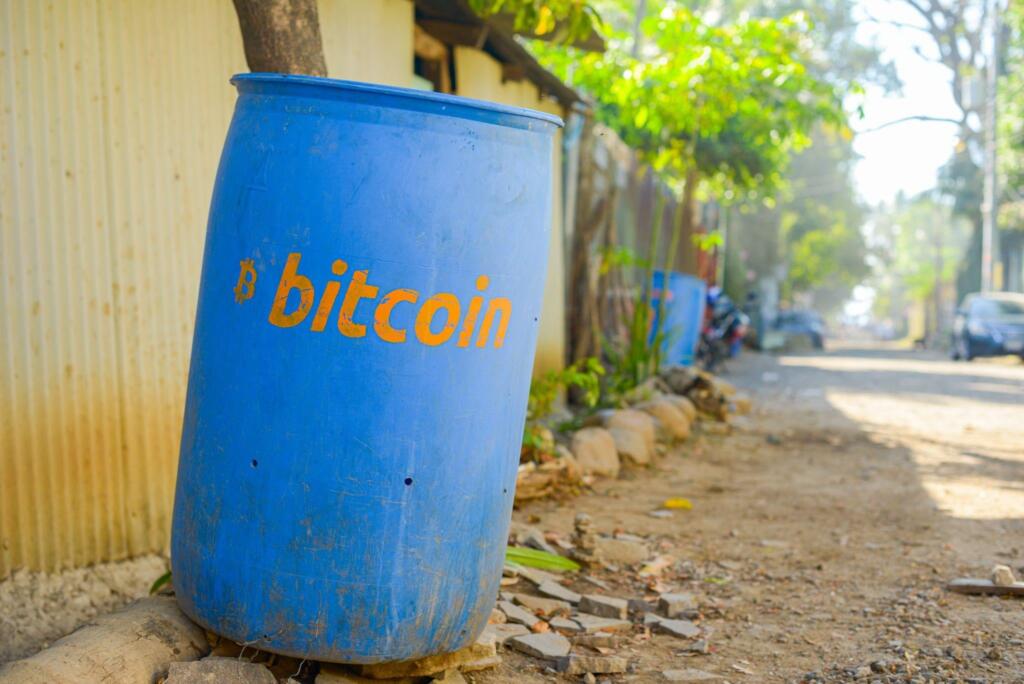
San Salvador has a thriving crypto community that is constantly growing and evolving. The city has become a hub for crypto enthusiasts and entrepreneurs, thanks to the government’s recent decision to adopt Bitcoin as legal tender. This move has created a significant buzz in the crypto world, with many businesses and individuals flocking to the country to explore the new opportunities that this presents.
The crypto community in San Salvador is made up of a diverse group of people, including blockchain developers, crypto traders, miners, investors, and enthusiasts. They are passionate about all things crypto and constantly explore new technologies and use cases for blockchain and cryptocurrencies.
There are several organizations and meetups in San Salvador that cater to the needs of the crypto community. These include the Bitcoin Embassy, a nonprofit organization that promotes the use of Bitcoin and other cryptocurrencies, and the Blockchain Academy, which provides training and education for blockchain developers and entrepreneurs.
The Legal Status of Cryptocurrencies in El Salvador
El Salvador recognized Bitcoin as a legal tender beginning September 7, 2021, making it the first country in the world to do so. The legislation, known as the Bitcoin Law, was proposed by President Nayib Bukele and was approved by the country’s Congress in June 2021.
Under this law, businesses in El Salvador must accept Bitcoin as a form of payment alongside the US dollar, which has served as the country’s official currency since 2001. Additionally, the law stipulates that transactions made in Bitcoin are exempt from capital gains tax.
El Salvador’s bold move to adopt Bitcoin as a legal tender has been met with mixed reactions. Proponents of the law believe it will help promote financial inclusion and bring economic benefits to the country, particularly in remittances, which comprise a substantial portion of its GDP. They also argue that the move will help to increase the use of cryptocurrency worldwide.
However, opponents of the law have raised concerns about the potential risks associated with adopting Bitcoin, including its volatility and the lack of consumer protection. Critics also argue that the move may increase money laundering and other illicit activities.
Taxation
Since El Salvador adopted Bitcoin as legal tender, the decision to recognize Bitcoin as a currency has had significant implications for taxation in the country, as the use and trading of cryptocurrencies are subject to different tax rules.
However, El Salvador has recently announced its decision to remove taxes on technological advancements. This move coincides with the establishment of the National Bitcoin Office (ONBTC), also known as “the Bitcoin Office.”
On April 1, 2023, President Bukele submitted a bill to Congress to eliminate Capital gains, property, and income taxes on technology innovations such as software programming, coding, app, AI development, and computing and communications hardware manufacturing.
The President is keen on reducing all tax requirements that impede technological development.
Following El-Salvador’s friendly crypto regime, many people (particularly crypto enthusiasts) have moved and settled in the country, eager to harvest the fresh low lying blockchain fruits. If you’ve been active on twitter recently, you must have noted the country trending with several cryptopreneurs upbeat about moving to settle and explore the opportunities therein.
How many Bitcoin ATMs are there in El Salvador?
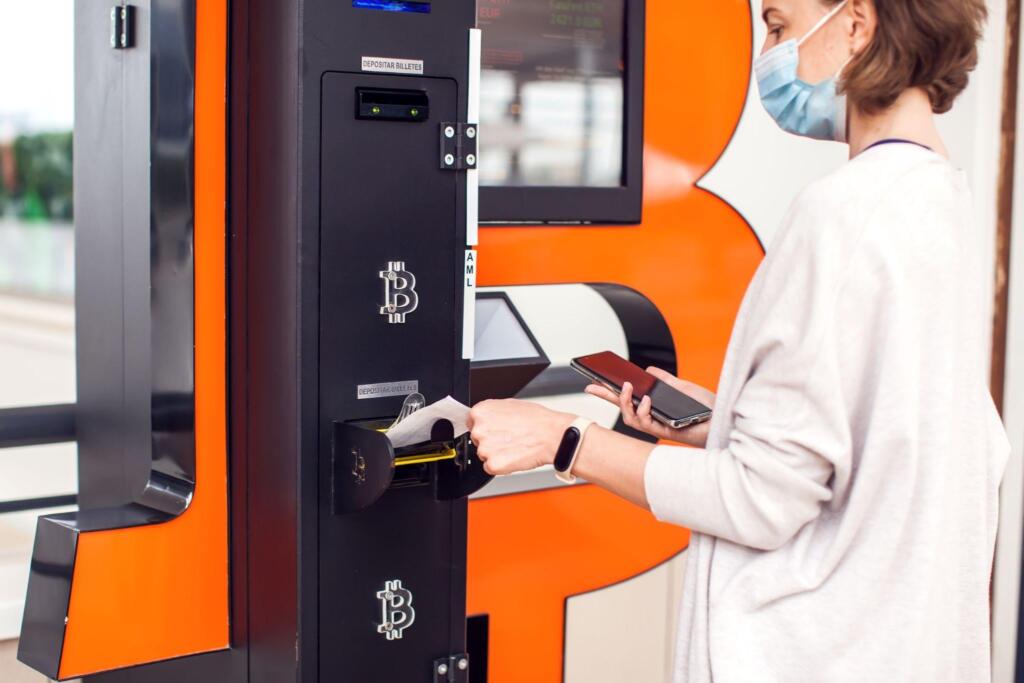
According to data from Coin ATM Radar, El Salvador has 212 ATMs, with 28 installed in San Salvador.
| Major Cities in El Salvador with the Highest Number of Bitcoin ATMs | |||
| City | Code | Department | Number of Bitcoin ATMs |
| San Martin | SV-SS | San Salvador | 32 |
| San Salvador | SV-SS | San Salvador | 28 |
| Santa Tecla | SV-LI | La Libertad | 25 |
| Santa Ana | SV-SA | Santa Ana | 14 |
| San Miguel | SV-SM | San Miguel | 11 |
| Sonsonate | SV-SO | Sonsonate | 9 |
| La Libertad | SV-LI | La Libertad | 7 |
| Ahuachapan | SV-AH | Ahuachapán | 6 |
| Cojutepeque | SV-CU | Cuscatlán | 4 |
| Zacatecoluca | SV-PA | La Paz | 4 |
| San Francisco Gotera | SV-MO | Morazán | 4 |
| Ciudad Barrios | SV-SM | San Miguel | 4 |
| Metapan | SV-SA | Santa Ana | 4 |
| Usulutan | SV-US | Usulután | 4 |
The high number of Bitcoin ATMs in El Salvador is significant because it demonstrates the country’s strong commitment to embracing Bitcoin as a legal tender.
The government’s decision to legalize Bitcoin aimed to promote financial inclusion and innovation, reduce remittance costs, and attract investment to the country. By installing many Bitcoin ATMs across the country, the government is making it easier for Salvadorans to access and use Bitcoin daily.
The widespread availability of Bitcoin ATMs also helps to increase Bitcoin adoption and usage among the general population, including those who may not have access to traditional banking services. This is particularly important in El Salvador, where around 70% of the population is unbanked or underbanked.
The crypto community
San Salvador has a thriving crypto community that is constantly growing and evolving. The city has become a hub for crypto enthusiasts and entrepreneurs, thanks to the government’s recent decision to adopt Bitcoin as legal tender. This move has created a significant buzz in the crypto world, with many businesses and individuals flocking to the country to explore the new opportunities that this presents.
The crypto community in San Salvador is made up of a diverse group of people, including blockchain developers, crypto traders, miners, investors, and enthusiasts. They are passionate about all things crypto and are constantly exploring new technologies and use cases for blockchain and cryptocurrencies.
There are several organizations and meetups in San Salvador that cater to the needs of the crypto community. These include the Bitcoin Embassy, a nonprofit organization that promotes the use of Bitcoin and other cryptocurrencies, and the Blockchain Academy, which provides training and education for blockchain developers and entrepreneurs.
Blockchain Startups
Without a doubt, Elsalvador’s recent declaration of Bitcoin as a legal tender has led to a surge of interest in blockchain technology and cryptocurrency startups in the country. Here are some of the startups you might interact with while there.
Pisto.net
Pisto.net creates software solutions that enable retailers to accept Bitcoin payments without needing a dependable internet connection. To accomplish this, the system employs an open-source server called BTCPAY to produce invoices and a mobile app that can request these invoices via encrypted text message. With this technology, even retailers in rural areas without stable internet can receive Bitcoin payments from their customers. Additionally, the system sends out notifications when payments are received.
Fiado App
This startup has built an AI model using non-traditional data from their customers’ phones to underwrite personal loans. Clients can apply and are approved in-app. GPS location directs them to the nearest convenience store for disbursements/collections. They have also gamified their app to increase user activity and modify customer behaviors. This new data is instrumental in research for other in-app models, such as one that predicts a person’s likelihood to default (before they do).
Pulpo Fintech
Pulpo’s strategic direction focuses on developing products that facilitate the access of MSMEs, especially those led by women, to Financial Services, Health Services, and Alternative Payment Methods, providing solutions to those who are financially excluded, unbanked, and/or neglected.
The startup’s value proposition is based on being the hand and support that clients need to develop their businesses through technological distribution.
Solscription
Solscription offers a straightforward protocol that allows websites, apps, communities, and businesses to effortlessly accept subscription payments using native EVM currencies or stable tokens.
Their operations are primarily divided into three key components;
- Smart Contracts: The crypto subscription logic is handled by smart contracts.
Using Solscription’s deployer (deployer.solscription.io/), anyone can recreate a personalized template of the logic for their individual or business needs with a single click.
- Marketplace Website: A marketplace (market.solscription.io/) where trusted users of deployer can list their offerings. This way, subscribers can manage their favorite subscriptions in one place.
- Bots/API/SDKs: Bots, APIs, and SDKs serve as the final crucial piece of the puzzle, enabling websites and apps to recognize a user’s subscriptions and grant access to private content.
Why are crypto enthusiasts flocking to El Salvador?
Since Elsalvador recognized Bitcoin as legal tender, the move has garnered much attention from crypto enthusiasts worldwide, who see it as a significant milestone in the mainstream adoption of cryptocurrencies. As a result, many crypto enthusiasts are now flocking to El Salvador to take advantage of the country’s crypto-friendly policies and infrastructure.
The low cost of living
One of the main reasons why crypto enthusiasts are attracted to El Salvador is the low cost of living. The country is one of the most affordable in Central America, with a relatively low cost of living, making it an ideal destination for digital nomads and crypto traders who want to live on a budget while still enjoying a high quality of life.
Favorable tax policies
As discussed earlier, El Salvador also has favorable tax policies for cryptocurrency traders and investors. The country does not levy capital gains taxes on Bitcoin and other cryptocurrencies, making it a popular destination for those who want to trade or invest in cryptocurrencies without worrying about taxes eating into their profits.
Crypto-friendly infrastructure
Another reason crypto enthusiasts are moving to El Salvador is the availability of crypto-friendly infrastructure. Since the country has officially adopted Bitcoin as a legal tender, it has become more accommodating to crypto-related businesses, with several exchanges and other related businesses setting up shop in the country. This infrastructure makes it easier for crypto enthusiasts to transact in cryptocurrencies and access related services without worrying about legal hurdles.
Digital nomad opportunities
Exclusive Digital nomad platforms, particularly Nomad List, have many opportunities for remote workers. Find some on this page.
Digital nomad communities
There are several ways for a digital nomad to find digital nomad communities in across the country.
Online forums and social media groups
There are several online communities and social media groups where digital nomads can connect. Some popular platforms include Facebook groups like Digital Nomads MeetupEl Salvador Expats & Nomads. Nomad List also has a vibrant digital nomad forum in the chatroom
Co-working spaces
Several co-working spaces in El Salvador cater to digital nomads. These spaces not only provide a workspace but also offer networking opportunities and events for the community. Some popular co-working spaces beside the ones we’ve already discussed include;
Find several others on the Nomad List website.
Meetup groups
Meetup.com is a popular platform for organizing and attending events, and there are several meetup groups that cater to digital nomads. Some popular meetup groups include,
- Digital Nomads San Salvador
- El Salvador Expat and Travel Meetup
Local events
Several local events in El Salvador bring together the digital nomad community. These events include networking events, workshops, and conferences. Some popular events include the El Salvador Tech Meetup.
Popular recreational activities and fun spots
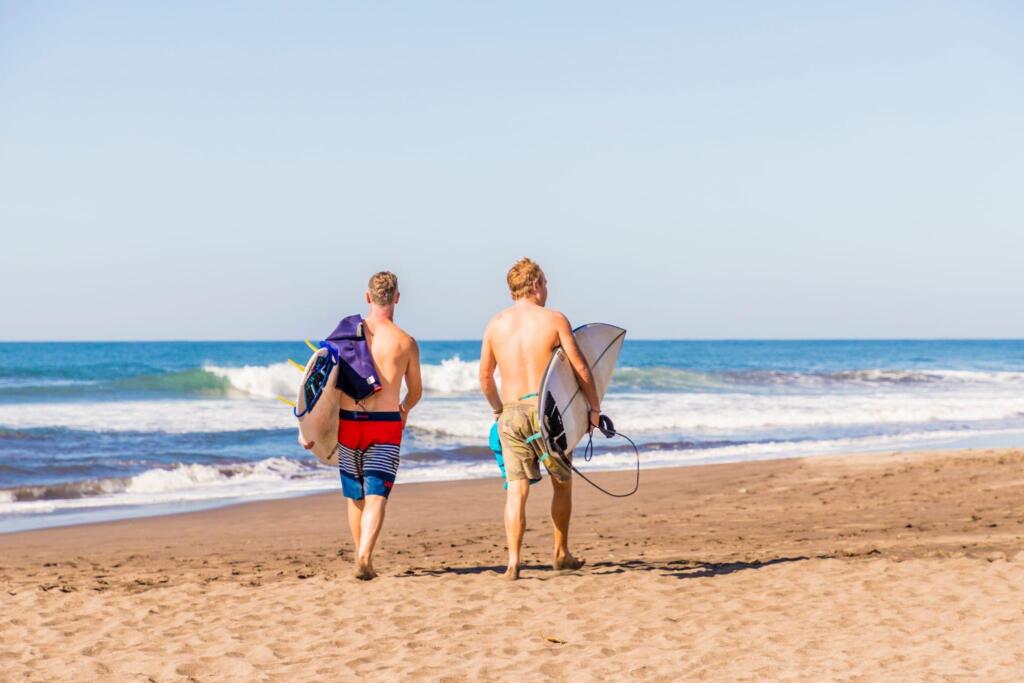
San Salvador offers a variety of recreational activities and fun spots for tourists and natives. Here are some popular ones
Parque Nacional El Boquerón
Parque Nacional El Boquerón is a picturesque national park in the majestic San Salvador Volcano, offering awesome panoramic views of the city and the surrounding landscape. You can engage in various outdoor activities such as hiking, bird watching, and exploring the park’s nature trails, which feature diverse flora and fauna.
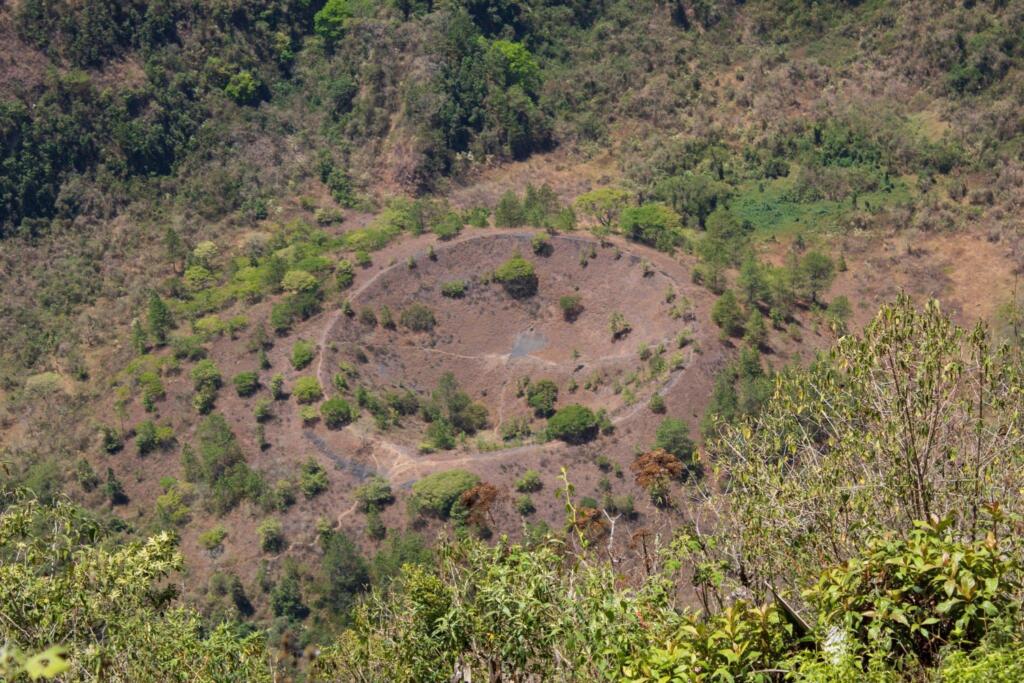
The park is ideal for picnicking, enjoying a barbecue with friends and family, or just basking in the beauty of the natural environment. If you are seeking an exceptional destination to immerse yourself in nature while taking in some magnificent views, then this is the place to be.
Joya de Cerén Archaeological Site
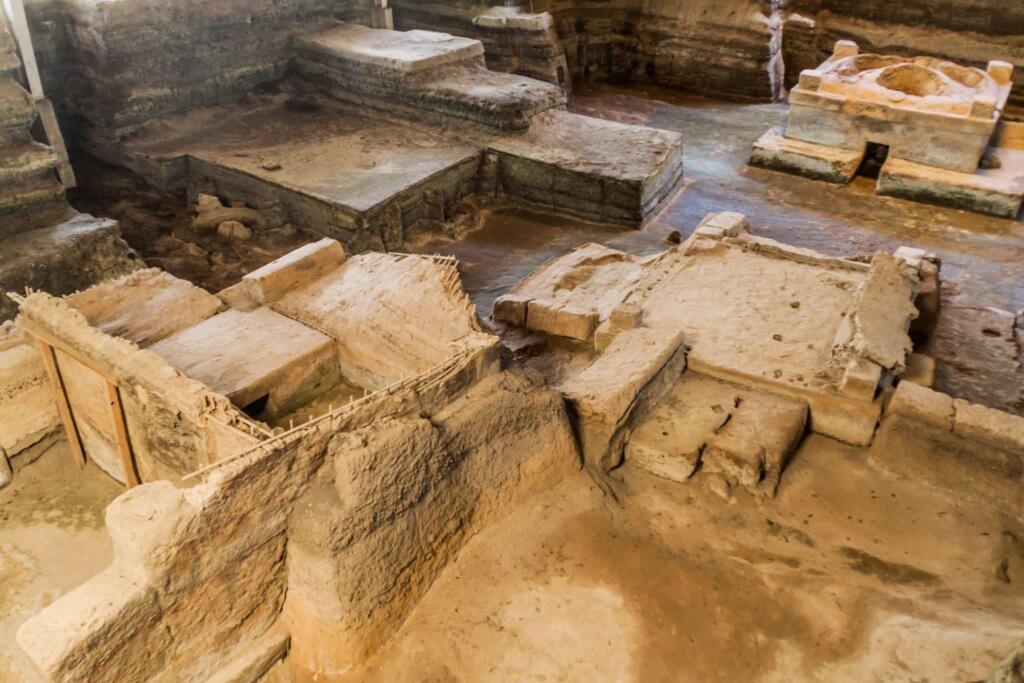
Over 1400 years ago, a Mayan village was buried and preserved under a volcanic eruption. Located in El Salvador, this UNESCO World Heritage Site offers visitors a glimpse into the Mayan people’s daily life before the nearby Loma Caldera volcano eruption in 600 AD. The site contains numerous well-preserved structures and artifacts, including homes, communal kitchens, and agricultural tools. Taking a tour of Joya de Cerén gives you exclusive insights into the past and traditions of the locality. It allows you to appreciate the remarkable endurance of the early Mayan civilization.
The Multiplaza
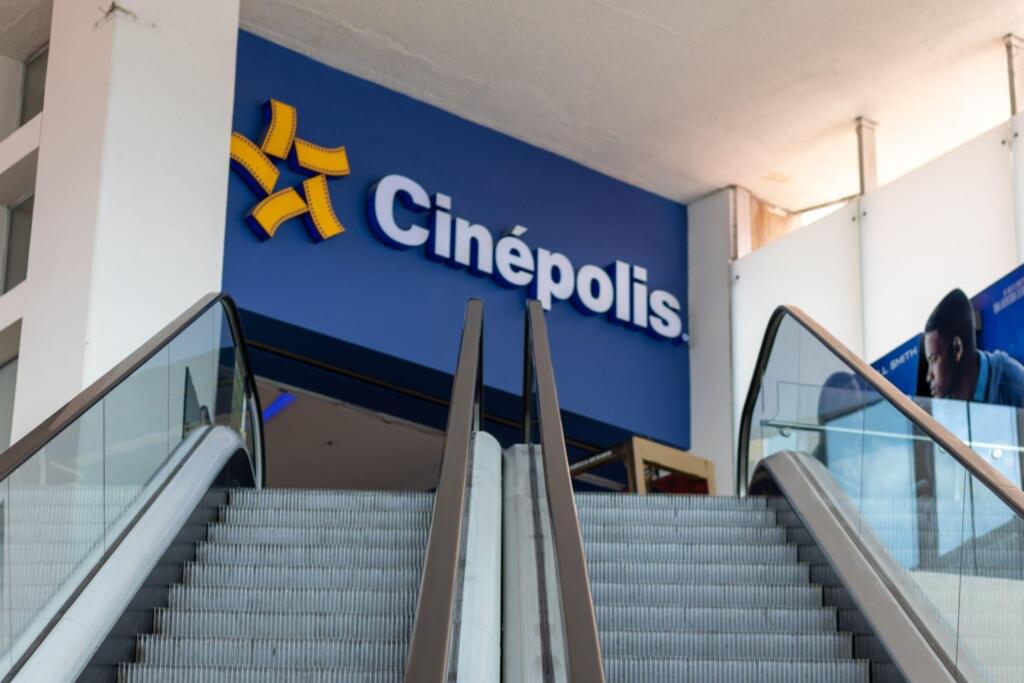
This is a premier shopping destination in the city. With its vast array of stores, restaurants, and entertainment options, it is a favorite among locals and tourists. The shopping center boasts numerous high-end fashion brands, electronics, and home decor stores.
The cinema and arcade offer a fun escape for families and groups. With its prime location and ample parking space, Multiplaza is easily accessible and convenient for visitors. The Multiplaza provides a one-stop-shop experience, catering to all shopping and leisure needs in one location.
Lake Coatepeque
Lake Coatepeque is a stunning volcanic lake in San Salvador, El Salvador. This magnificent body of water is just a short distance from the city and is a popular destination for locals and visitors. The lake offers various water activities, such as swimming, boating, and fishing, making it a perfect spot for an outdoor digital nomad.
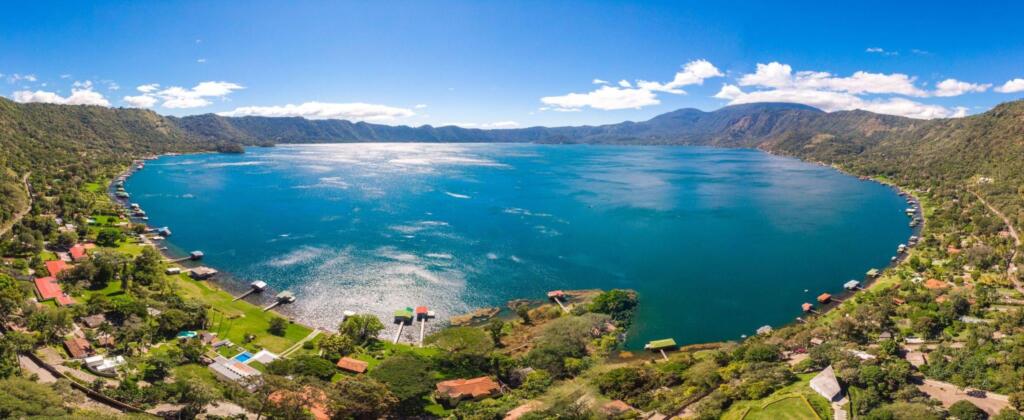
Besides water activities, visitors can enjoy hiking, bird-watching, and picnics with family and friends. With its crystal-clear blue water, lush green surroundings, and awe-inspiring views, Lake Coatepeque is a must-visit destination for nature lovers visiting San Salvador.
Museo de Arte de El Salvador
The Museo de Arte de El Salvador is a prominent cultural institution with an extensive collection of modern art from local and international artists. Found in the heart of the Zona Rosa neighborhood, the museum offers visitors a chance to explore the rich artistic heritage of El Salvador through a diverse range of exhibitions, workshops, and events.
The museum’s permanent collection boasts works by some of the most renowned Salvadoran artists of the past century, while its temporary exhibitions showcase the latest trends and innovations in contemporary art. Generally, the Museo de Arte de El Salvador is a must-visit destination for a nomad interested in exploring the dynamic world of Salvadoran art.
Transportation
San Salvador has various transportation modes available, including air and road. Let’s look at each option independently.
Air transportation
The primary airport in San Salvador is the El Salvador International Airport. It is situated 40 km southeast of the city center of San Salvador. The estimated travel time by car or taxi is around 45 minutes.
Many airlines operate flights to and from this airport, making air travel an easy option for those traveling to or from San Salvador.
Bus transportation
Bus transport in San Salvador is a popular and affordable way to travel around the city. The buses are operated by private companies and come in various sizes and colors, ranging from small microbuses to larger buses. The bus routes cover almost every part of the city, making it convenient for commuters to reach their destination.
However, bus transport in this city has its share of challenges. The buses can be overcrowded, especially during peak hours, and safety can be a concern. Some buses may also lack proper maintenance, making the rides uncomfortable or unsafe.
More recently, though, efforts have been made to improve the bus transport system in San Salvador. The city has introduced a Bus Rapid Transit (BRT) system called Metrobús, which aims to reduce congestion and improve the quality of service. The new buses are modern and have air conditioning, making the ride more comfortable. However, the BRT system is not yet fully implemented, and many areas of the city still rely on the traditional bus system.
Railway transport
As of April 10, 2023, El Salvador has no operational trains. The national railroad corporation responsible for managing the railway network in the country is FENADESAL (Ferrocarriles Nacionales de El Salvador), which is a division of CEPA (Comisión Ejecutiva Portuaria Autónoma, port authority). FENADESAL oversees 554.8 km of disused 3 ft (914 mm) narrow gauge lines that previously connected major cities.
Taxi transportation

Taxi cub
Taxi services in San Salvador are abundant and readily available throughout the city. There are different types of taxis available, including regular taxis, luxury taxis, and airport taxis. Of course, taxi-hailing apps are also available.
Regular taxis
Regular taxis are the most common type of taxi in San Salvador. They are usually painted in distinctive colors and have meters that calculate the fare based on the distance traveled. The fares for regular taxis are generally reasonable and affordable for most people.
Luxury taxis
These are another option for those looking for a more comfortable ride. These taxis are usually newer and more spacious than regular taxis, and they often come equipped with amenities such as air conditioning, leather seats, and Wi-Fi. Luxury taxis are typically more expensive than regular taxis, but they offer a higher level of comfort and convenience.
Airport taxis
Airport taxis are available at the international airport in San Salvador. They are authorized to pick up passengers at the airport and take them to their destination. The fares for airport taxis are higher than regular taxis, but they offer travelers a reliable and convenient option
Safety is one thing to remember when using the above three taxi categories anywhere. Use a reputable taxi service and avoid unmarked taxis or taxis that do not have a visible identification number. It is also a good idea to negotiate the fare before getting into the taxi, especially for longer journeys.
Taxi-hailing apps
Hailing a taxi has never been easier with the advent of taxi-hailing apps. These apps provide a hassle-free and convenient way for riders to hail a ride from a nearby driver. Upon requesting a ride, the app instantly provides an estimated wait time and the driver’s expected arrival time. The app also lets you track your driver’s location in real-time, ensuring you are always aware of their whereabouts.
In addition to their convenience, these taxis are often more cost-effective, making them an ideal choice for budget-conscious travelers. With transparent pricing, you can see the fare upfront and know exactly how much you’ll pay before you enter the car.
Moreover, these taxis prioritize passenger safety. Most taxi-hailing apps mandate that their drivers undergo a thorough background check before being allowed to drive. What’s more, some apps enable you to share your trip details with friends or family, providing an extra layer of security and peace of mind for you and those who care.
There are several taxi-hailing apps available in El Salvador, including
Taxi for persons with disability
If you or someone you know uses a wheelchair and needs a taxi in San Salvador, you’ll be glad to know that there are private taxi providers that can accommodate wheelchairs. However, standard taxis on the street may only be able to carry a folded wheelchair in their trunk. It is better to opt for private tour operators who offer accessible vehicles and are better equipped to transport passengers with reduced mobility comfortably and safely. It’s important to book in advance with your preferred provider to ensure availability.
| Rate | |
| Taxi Start (Normal Tariff) | $5.00 |
| Taxi 1 km (Normal Tariff) | $3.11 |
| Taxi 1 hour Waiting (Normal Tariff) | $10.00 |
Other modes of transportation
Other transportation options in San Salvador include rental cars, bicycles, and motorcycle taxis. Rental cars are a good option for those who prefer to drive themselves, while bicycles are a fun and eco-friendly way to explore the city. Motorcycle taxis are a popular option for short trips but should be used cautiously due to safety concerns.
Security and safety
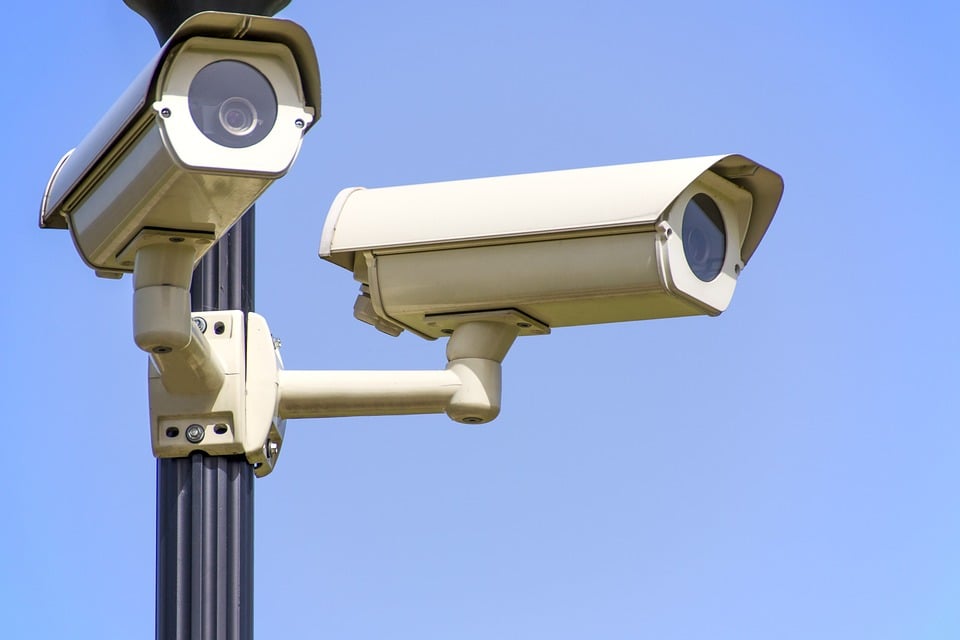
Surveillance equipment:
Despite the moderate concerns about being insulted in San Salvador, the data by numbeo shows a high level of crime, with a significant increase in the past three years.
The most common worries among the population are being mugged, having their car stolen or things from their car stolen, and being attacked. These areas scored between 64-73%. Additionally, there are moderate worries about home burglary and people using or dealing drugs at 56%.
Property crimes such as vandalism and theft and violent crimes, including assault and armed robbery, are high. On an encouraging note, though, concerns about being subject to a physical attack due to skin color, ethnic origin, gender, or religion are low, scoring just 20%.
Although the safety of walking alone during daylight is moderate, it is generally unsafe to venture out alone at night in San Salvador.
Taking precaution
Such reports notwithstanding, most visits to El Salvador are indeed trouble-free. To reduce the risk of life-threatening incidents, it is recommended to exercise additional caution in areas of towns and cities that are more run down and less frequented by tourists.
Better still, seek advice from locals regarding safer areas, but always remain vigilant. Do not wear expensive jewelry or display valuable items, and take necessary precautions to protect your passport, mobile phone, and cash from pickpockets.
If you’re in San Salvador, areas such as Santa Elena, San Benito, and Maquilishuat are known to have better security, as do most of the larger shopping malls.
Emergency call numbers
You can access emergency services in El Salvador by dialing 911 for immediate assistance.
Tourist Police
To ensure the safety of tourists, the tourist police, also known as POLITUR, provides a security presence in tourist areas and offers urgent first-response assistance to visitors. If you require their assistance, call (503) 2511-8302 or (503) 2511-8300.
Health Hotline
The Salvadoran government has established a hotline to connect individuals with medical professionals or request urgent medical assistance. In case of a medical emergency, dial either 132 or 911 and ask for a 132 operator.
The Air Quality
Analysis of data from IQAir shows that the current air quality in San Salvador is considered good, with an ‘AQ’ or air quality index (AQI) of 42, and the main pollutant is PM2.5. However, the concentration of PM2.5 in the air is two times higher than the World Health Organization’s (WHO) annual air quality guideline value, indicating that the air quality could still pose health risks for vulnerable populations.
To protect yourself from air pollution in San Salvador, it is recommended to open windows only when air quality is good, as outdoor air pollution can also affect indoor air quality. Using a monitor to track air quality can help you stay informed and take necessary precautions when pollution levels are high.
When participating in outdoor activities, you should be mindful of the air quality by wearing a mask to reduce exposure to harmful pollutants. Persons susceptible to respiratory illnesses, children, and seniors should take extra precautions to avoid exposure to polluted air, including staying indoors during periods of high pollution.
Santa Ana city, El Salvador
Santa Ana is located 64 kilometers northwest of El Salvador and is known for its dynamic culture, history, and architecture. Known by that name since 1708, it serves as the commercial center of western El Salvador. The city is renowned for its coffee processing industry and hosts one of the world’s largest coffee mills, El Molino.
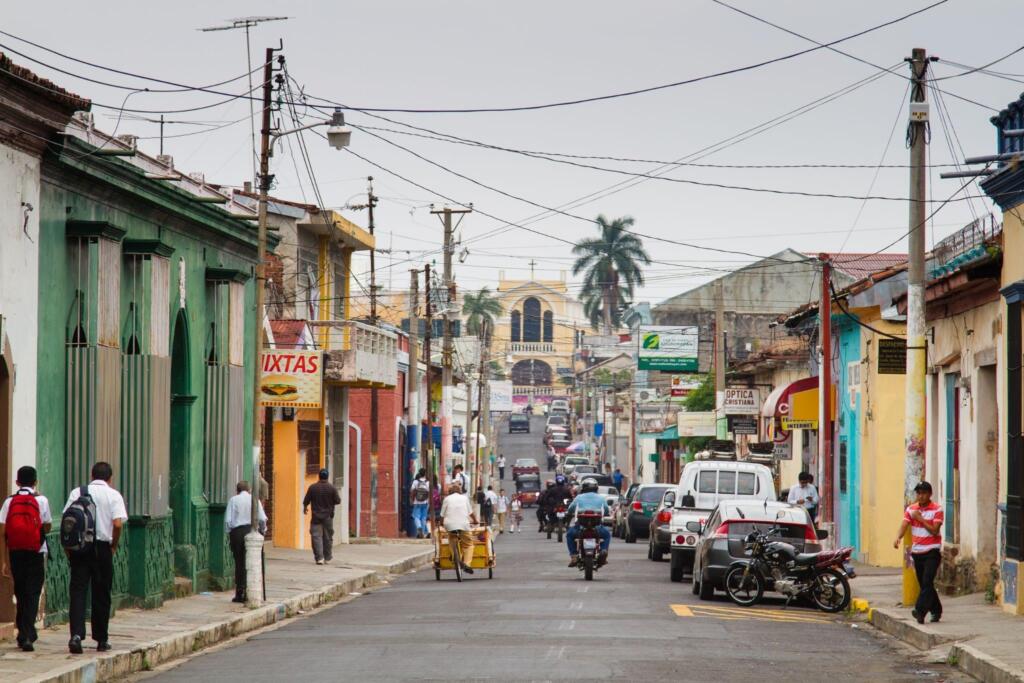
With over 270,000 people, it is the second-largest city after the capital, San Salvador. The area boasts numerous landmarks, including the Santa Ana Cathedral, the National Theatre, and the Museum of Anthropology, which features ancient Mayan artifacts. The city also has several parks and plazas, such as the Parque Libertad and the Plaza de la Cultura, which host various yearly cultural events. While here, you can enjoy local cuisine, traditional crafts, and nearby attractions like the Santa Ana volcano and Lake Coatepeque.
The cost of living in Santa Ana, El Salvador
The cost of living in Santa Ana City is relatively affordable, and there are options to suit different budgets.
Accommodation
Santa Ana City offers a range of accommodation options at different prices. For instance, a 1-bedroom apartment in the city center with 40m2 or 430ft2 of space goes for about $574, while a cheap 1-bedroom apartment with similar space costs roughly $136. Similarly, a cheap 3-bedroom apartment with 80m2 or 860ft2 of space costs about $299.
If you prefer a more immersive experience, homestay options are available where you can stay with a local family and experience the culture firsthand. This can be arranged through organizations or websites such as Homestay.com or Airbnb.
Utilities
Regarding utilities, the cost for one person, including electricity, heating, water, and other utilities, is approximately $40.1, while a family can expect to pay some $60.8. For internet access with a speed of 50Mbps and a 1-month unlimited plan, you’ll need to pay about $49.
Internet Speeds
Considering data by speedTest, the median download speed in Santa Ana City, El Salvador, is 37.62 Mbps, and The median upload speed is 7.80 Mbps. The median latency of 18 ms is relatively low, indicating that the fixed internet connections in Santa Ana City have a fast response time. Lower latency values indicate faster internet connections and can result in smoother and more responsive online experiences, such as faster web browsing, quicker online gaming, and improved video conferencing.
Groceries
Rice costs about $1.14 in Santa, according to livingcost.org. This is a common food staple in El Salvador, and the price of $1.14 for 1 kg or 2.2 lb is relatively affordable. It is worth noting that El Salvador is one of the largest rice producers in Central America. The price of bread seems reasonable at $1.67 for 0.5 kg or 1.1 lb. It is a staple food item in many households and is commonly consumed in El Salvador.
Here are some other groceries items in Santa Ana, El Salvador, along with their approximate prices as of Mid-April, 2023
| Item | Quantity/ Size | Price |
| Milk | 1L or 1qt | $1.73 |
| Eggs | x12 | $2.43 |
| Cheese | 1kg or 2.2lb | $6.22 |
| Simple haircut | 1 | $10.00 |
| Apples | 1kg or 2.2lb | $3.25 |
| Banana | 1kg or 2.2lb | $1.81 |
| Oranges | 1kg or 2.2lb | $2.26 |
| Wine (mid-priced) | 750 mL bottle | $8.93 |
| Beer | 0.5 L or 16 FL oz | $1.53 |
| Cigarette pack | 1 | $3.97 |
Co-working Spaces
Co-working spaces provide entrepreneurs, freelancers, and remote workers with a flexible and collaborative environment to work from. Santa Ana, El Salvador, is no exception, with several co-working spaces in the city to cater to the growing demand.
StartUp Santa Ana
This is a co-working space located in the heart of Santa Ana at the following street address;
- 17 calle oriente, independencia y 3ra avenida sur, Santa Ana, El Salvador
- Phone +503 2421 9477
Looking at their website, it is clear that the space offers a modern and stylish environment with lots of natural light, making it an ideal workplace. Additionally, they offer high-speed internet, printing and scanning services, and meeting rooms that can accommodate over 15 people. Typical of a modern co-working space, StartUp Santa Ana hosts workshops, seminars, and networking events regularly, making it an ideal space for entrepreneurs to connect and collaborate.
The 44 HUB
Another notable co-working space in Santa Ana is the 44 HUB, located at the following address;
- 44 HUB, 15 Ave Sur, entre 9a Calle oriente y, Calle Santa Cruz, Santa Ana, El Salvador
- Phone +503 2421 5007
Fun things to do in Santa Ana
As with San Salvador, there is so much you can do in Santa Ana.
Metrocentro Santa Ana Shopping
Metrocentro Santa Ana is a modern and lively shopping mall in Santa Ana. With over 100 stores, restaurants, and entertainment options, it is one of the region’s largest and most popular shopping destinations. Here are some of the things you may do at the mall.
Go shopping
One of the main activities to do in Metrocentro Santa Ana is shopping. The mall features a wide range of stores, from international fashion brands to local artisan shops, offering visitors a diverse selection of products. Whether you are looking for clothes, shoes, accessories, electronics, or home goods, you will likely find them here.
Catch the latest movie
Aside from shopping, there are many other activities to do at the mall. For example, you can catch the latest movie releases at the Cinemark theater, which features several screens and comfortable seating. You can also enjoy various delicious meals at the food court, which offers both local and international cuisine.
Enjoy gaming
If you enjoy gaming, there is a modern arcade with a wide selection of games, from classic pinball machines to cutting-edge virtual reality experiences.
Additionally, several entertainment venues host live music performances, stand-up comedy shows, and other cultural events throughout the year.
Tour the Cerro Verde Volcano
This dormant volcano stands at 2,030 meters above sea level and is part of the Cordillera de Apaneca mountain range. The national park surrounding Cerro Verde is a popular tourist destination due to its scenic views and hiking trails. The area is also home to various wildlife, including hummingbirds and butterflies.
Go out at night
The central park, Parque Libertad, is among the most popular joints to visit at night in Santa Ana. This park is the heart of the city and is surrounded by many bars, restaurants, and cafes. You can enjoy a delicious dinner at one of the many restaurants, followed by a walk around the park to enjoy the beautiful lights and the sound of live music. The park is also a great place to people-watch and soak up the local atmosphere.
Another popular night joint in Santa Ana is the historic theater, Teatro de Santa Ana. This beautifully restored theater hosts a variety of performances, including plays, musicals, and concerts. It is a great place to enjoy some of the local arts and culture while surrounded by the stunning architecture of the building.
If you are looking for a livelier night out, there are several clubs and bars in Santa Ana to choose from. One of the most popular is El Estribo, a nightclub on the city’s outskirts. This club features live DJs and dancing and is a great place to let loose and have fun.
How safe is Santa Ana City in El Salvador?
Although Santa Ana is relatively new to receiving tourists, the city is starting to see an influx of visitors. To ensure the safety of residents and tourists, the city is lined with armed guards who help keep the crime rate at bay. Despite the security measures, you should still exercise caution when moving around, especially in unsafe areas.
That being said, the residents of Santa Ana are known for being very welcoming and friendly toward visitors. While the city itself is generally safe, you should be aware that there are safe areas and areas that pose a higher risk of petty crime.
To make the most of your visit, it may be best to consider hiring a tour guide who can provide valuable insights and ensure that you stay safe while exploring all that the city has to offer.
Etiquette and manners in El Salvador are an important part of the country’s culture and society. The people of this great nation place a great emphasis on respect and politeness in their interactions with others, whether it be in social or professional settings.
Meeting and greeting
The meeting and greeting protocol in El Salvador is an important aspect of their culture. It is, therefore, important to understand and follow these customs when interacting with locals. Salvadorans are generally warm and welcoming and value respect and formality in social interactions.
In this society, formality is highly regarded, and it draws parameters among social relations. For example, only close friends and family members use first names, so it is customary to refer to people by their appropriate honorific title, such as “Senor” or “Senora,” followed by their surname.
When meeting, Salvadoran women commonly pat each other on the right forearm or shoulder instead of shaking hands. This is a friendly and respectful gesture that shows camaraderie and closeness. Close female friends may also hug and kiss on the right cheek as a greeting.
On the other hand, men shake hands with other men and women, but it is polite to wait for a woman to initiate a handshake. Salvadorans value respect and courtesy, so it is essential to observe these customs.
Moreover, when shaking hands, it is customary to use the right greeting for the time of day, such as “buenos dias” (good morning), “buenas tardes” (good afternoon), or “buenas noches” (good evening). This shows respect for the time of day and is considered polite.
The Dining Etiquette
El Salvadorans are known for their warm hospitality and value socializing greatly. Dining is considered a significant social event, and proper etiquette when visiting someone’s home includes the following:
- Arriving a little later than the invited time (30-45 minutes)
- Dressing appropriately as a sign of respect
- Do not yawn at the dinner table or openly in other public settings. It is considered vulgar
- Staying for at least an hour after dinner to converse with the hosts and other guests.
It’s best to avoid bringing up business discussions at the dining table unless prompted. While enjoying your time, it’s polite to consider how you can reciprocate your host’s kind gesture.
El Salvadoran table manners are Continental, with guests being served first and the host saying “buen provecho” to start the meal. All food is eaten with utensils, including fruit, and leaving a small amount on the plate is considered courteous. In this part of the world, meals are social occasions and can be lengthy, with lively conversation.
Toasts are common, with the host usually making the first one. It is essential to lift your glass and look at the person being toasted. If you don’t want to drink more, it’s polite to leave your glass one-quarter full.
Tipping
In El Salvador, tipping is not an ingrained part of the culture. Typically, when dining out, a 10% gratuity is already included in the bill, and while you may choose to give an extra tip, it’s not customary or expected. The same goes for taxi drivers and other service providers, who don’t generally anticipate receiving a gratuity. However, it’s worth noting that giving a tip to hotel porters for carrying your luggage is a more prevalent practice.
Political and economic stability
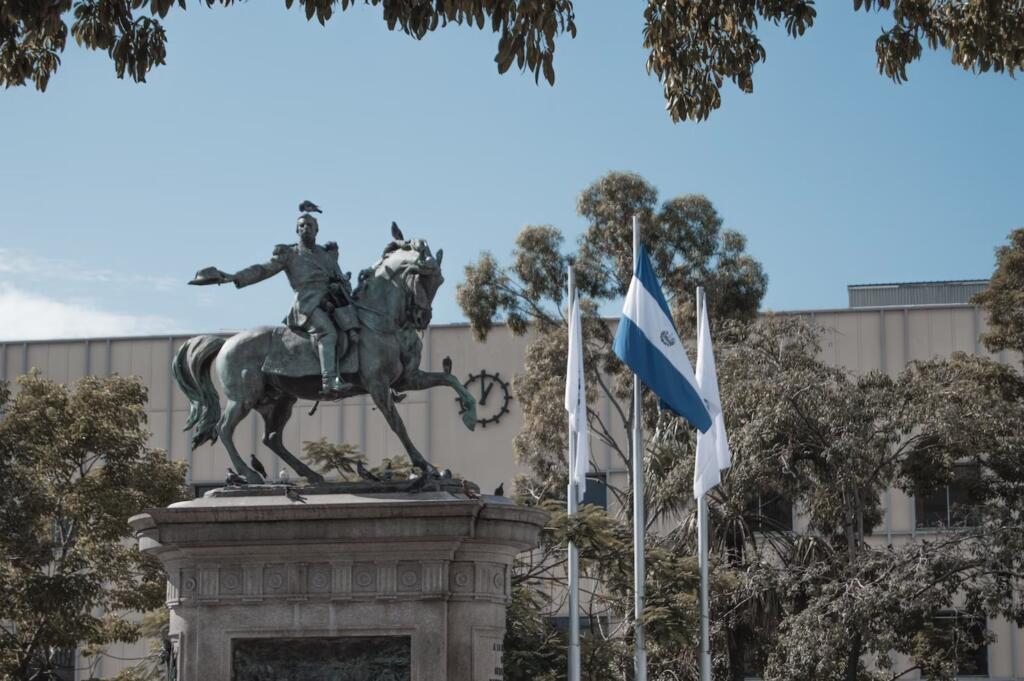
El Salvador’s national flag:
El Salvador has a complex history of political instability, economic struggles, and social unrest. However, in recent years, the country has made significant progress in terms of political and economic stability.
Political stability
According to a World Bank report released in April 2023, El Salvador’s estimate for Political Stability and Absence of Violence/Terrorism in 2021 was -0.21123. This indicator assesses the probability of political instability and politically-motivated violence, including terrorism, based on perceptions. The score for this composite indicator in the country is presented in units of a standard normal distribution, which covers a range of about -2.5 to 2.5.
Economic stability
El Salvador’s economic stability relies primarily on its service sector, which contributed 70% of the country’s USD 28.7 billion GDP in 2021. Manufacturing, construction, and agriculture accounted for 15.1%, 5.2%, and 4.9%, respectively, of the GDP.
While this economy has grown steadily over the past few decades, its annual GDP growth rate exceeded 3% only three times between 2000 and 2022.
However, the country has made significant strides in reducing poverty and inequality. Extreme poverty, defined as living on less than US$2.15 per day, declined from nearly 10% in 2010 to less than 1% in 2019. Additionally, El Salvador’s Gini coefficient, a measure of income inequality, fell from 0.54 in 1998 to 0.38 in 2019, the lowest level in the region.
Banco Central de Reserva de El Salvador’s report
According to Banco Central de Reserva de El Salvador, the Salvadoran economy experienced growth of 2.6% in 2022, exceeding the historical average for the second year in a row after the impact of the COVID-19 pandemic. This growth was reflected in employment, income, exports, investment, and household consumption.
In 2022, the nominal GDP value reached US$32,488.7 million, reflecting a significant increase of US$3,037.5 million compared to the previous year. This growth was attributed to President Nayib Bukele’s successful implementation of measures to combat gangs and enhance public security, which positively impacted the tourism industry. As a result, national and international visitors were attracted to popular tourist destinations, such as Surf City, which boosted domestic demand.
The projected growth for 2023 ranges between 2% and 3%. This low projection is due to adverse factors in the international environment, such as the Ukraine crisis. However, the government looks to counteract these and similar challenges by
- the promotion of tourism
- public investment projects
- boosting private investor confidence
- Enhancing local and international confidence in the country’s security situation
Inflation is expected to moderate and settle between 3.5% to 4.1% throughout the year.
Language and language barriers
The official language of El Salvador is Spanish, and it is spoken by the majority of the population. If you are not a native Spanish speaker, it would be good to learn some basic phrases and words to communicate with the locals. This will help you with day-to-day tasks such as ordering food, asking for directions, or shopping for groceries.
English proficiency
Spanish is Elsalvador’s official language, and most people speak it. If you are not a native Spanish speaker, it would be good to learn some basic phrases and words to communicate with the locals. This will help you with day-to-day tasks such as ordering food, asking for directions, or shopping for groceries.
The English proficiency Index score
Considering the EF English Proficiency Index (EPI) score, El Salvador has a moderate level of English proficiency, with a score of 519 out of 1,000. This places it at 50 out of 111 countries globally and 9 out of 20 in Latin America.
Compared to the global average score of 502, El Salvador’s English proficiency is slightly above average. However, in comparison to other countries in Latin America, El Salvador’s English proficiency is only moderate.
There could be several reasons for this moderate level of English proficiency in El Salvador. One possible reason is that Spanish is the country’s official language, and many Salvadorans may not have the opportunity to practice English regularly. Additionally, the education system in El Salvador may not prioritize English language learning or provide adequate resources for English language education.
Although Salvadorans may have a moderate level of English proficiency, many of them indeed possess functional knowledge of the language, particularly in tourist areas or industries that require English communication. However, there is a need to enhance English language education and training to raise the nation’s overall level of English proficiency.
Healthcare
The world population review website ranks global healthcare systems based on factors such as life expectancy, access to healthcare, quality of healthcare, health infrastructure, and healthcare expenditure.
In a 2020 survey, El Salvador was ranked 93 out of 195 countries evaluated. This means that this Central American nation is considered to have a relatively good healthcare system compared to other countries.
The World population review report is complemented by numbeo.com, whose data presents the results of a survey on different components of healthcare in El Salvador and the corresponding level of satisfaction among respondents. The satisfaction levels are rated on a scale from low to high, and the responses suggest that overall, the satisfaction level is moderate.
The surveyed components include;
- Medical staff’s skill and competency
- The speed of completing examinations and reports.
- Equipment for modern diagnosis and treatment.
- High satisfaction with the cost to you
- High convenience of location for you
The skill and competency of medical staff received a satisfaction level of 47.73%, which is moderate. This indicates that while the respondents are not highly satisfied, they are not entirely dissatisfied either. The speed in completing examinations and reports received a satisfaction level of 40.91%, which is again in the moderate range.
The satisfaction level for the equipment for modern diagnosis and treatment is a notch high, with a rating of 55.68%, but still in the moderate range. This suggests that while the respondents appreciate modern equipment for diagnosis and treatment, they may not be entirely satisfied with other aspects of healthcare.
The accuracy and completeness in filling out reports received a satisfaction level of 52.27%, which is moderate, and implies that respondents have mixed feelings about the quality of reports filled out by medical staff.
Satisfaction levels shoot dramatically to the sixty percent range for both cost and convenience of location for patients, with 68.18% and 61.36%, respectively. These high satisfaction levels indicate that respondents generally feel satisfied with the cost and location of healthcare services in the country.
Health Insurance for Digital Nomads
Although El Salvador has a public healthcare system, it may not meet the medical needs of all foreign digital nomads. Therefore, it is advisable to consider private health insurance options to ensure comprehensive coverage.
One option is to purchase international health insurance, which typically covers medical expenses, emergency medical evacuation, and repatriation.
Numerous providers offer flexible plans that can be tailored to the unique requirements of individual digital nomads. If you are residing in San Salvador, Seguros MultiSalud and Seguros de Salud are ideal private health insurance providers to consider.
Hospitals to consider while in El Salvador
El Salvador’s healthcare system comprises both the public and private sectors. The Ministry of Health operates 31 hospitals and 372 health units, while the ISSS (Social Security Institute) manages 11 hospitals and 71 health and community units. Additionally, there is only one military hospital in the country.
On the other hand, the private sector in El Salvador includes hospitals, clinics, and nonprofit organizations. There are around 30 private hospitals and over 116 private clinics, most of them in the major cities of San Salvador, Santa Ana, and San Miguel.
Let’s sample some of the facilities in San Salvador and Santa Ana.
Hospital de Diagnóstico
Hospital de Diagnóstico is a private hospital in San Salvador. It provides various medical services, including surgery, cardiology, neurology, and pediatrics. It is recognized as one of the best hospitals in the country and has state-of-the-art facilities.
Hospital Nacional Rosales
Also in San Salvador, Hospital Nacional Rosales is a public hospital known for its high-quality medical care. It has specialized departments in internal medicine, surgery, and pediatrics, as well as a trauma center and a burn unit.
Hospital de la Mujer
Hospital de la Mujer is a San Salvador-based hospital offering specialized medical care to women. It has departments in obstetrics, gynecology, and neonatology and is recognized for its high-quality care for women and newborns.
Hospital Regional De Santa Ana
This facility offers a range of medical services, including emergency care, surgery, pediatrics, and obstetrics. With modern facilities and highly trained staff, it is a leading healthcare provider in the region.
Vaccinations
The US health body CDC (Center for Disease Control Recommends) the following vaccines for travelers visiting El Salvador.
1. Routine Vaccinations
All travelers must have certificates for routine vaccinations such as measles-mumps-rubella (MMR), diphtheria-tetanus-pertussis (DTaP), varicella (chickenpox), polio, Covid 19 and the yearly flu shot.
2. Hepatitis A
You contract this virus through contaminated food and water.
3. Hepatitis B
This virus can be transmitted through infected blood, needles, and sexual contact. The vaccine is recommended for travelers who may have sexual contact with new partners, get a tattoo or piercing, or have medical procedures in El Salvador.
4. Typhoid
You can contract Typhoid fever through contaminated food and water. The vaccine is recommended for travelers who will be staying with local families, backpacking, or traveling to remote areas of the country.
5. Rabies
Infected animals, including dogs, transmit rabies. Therefore, you need this vaccine if you will be in close contact with animals or who are planning outdoor activities such as hiking or camping.
6. Malaria
Malaria parasites can be transmitted through the bite of infected mosquitoes. While there is no vaccine for malaria, travelers to El Salvador are advised to take antimalarial medication before, during, and after their trip.
It helps to note that the CDC’s recommendations may vary depending on the individual traveler’s health status, itinerary, and length of stay in a destination country. It is, therefore, recommended that you consult with a healthcare provider before traveling to ensure that you are up-to-date on all necessary vaccinations and precautions.
Electrical standards
Voltage in El Salvador is standardized at 120 volts, which is the same voltage used in the United States and Canada. This voltage is commonly used for electrical outlets and is compatible with most electronic devices used in North America. In jurisdictions such as Europe and Asia, the standard voltage is 220-240 volts. Therefore, if you are traveling from a country with a different voltage, you must check if your electronic devices are compatible with the voltage in El Salvador.
Plugs
El Salvador uses Type A and Type B plugs, which are also used in North America. Type A plugs are two-pronged, while Type B plugs have an additional grounding prong. These plugs are designed to fit into the electrical outlets found in El Salvador, which are typically found in a horizontal orientation. If you are traveling from a country with different plug types, you’ll need to bring a plug adapter to ensure that your electronic devices can be properly plugged in.
Of course, older buildings in some countries have electrical outlets that do not conform to the current standards, and El Salvador is no exception. In such cases, it is important to exercise caution and ensure that your electronic devices are properly grounded to prevent any electrical hazards. Additionally, it is recommended that you check with your accommodation or a local electrician to ensure that your devices are compatible with the electrical outlets in your specific location.
Telephone and internet plans
In El Salvador, several telecommunications companies offer telephone and internet services, including Tigo, Claro, and Movistar. Each of these companies offers various plans to suit different needs and budgets.
For example, Tigo offers various internet plans with different speeds and data limits. Some of its popular plans offer speeds of up to 500 Mbps and unlimited data.
Claro also offers a range of internet plans, with speeds of up to 100 Mbps and 200 Mbps, respectively. In addition, the company offers different phone plans with varying minutes and data limits.
Movistar, another major telecommunications provider in El Salvador, offers internet and phone plans. Its internet plans offer speeds of up to 300 Mbps and unlimited data. The company’s phone plans also offer varying amounts of minutes and data.
The prices and availability of these plans may vary depending on location and other factors. Other telecommunications companies in El Salvador may also offer phone and internet services. Therefore, it’s important to thoroughly research and compare different plans and providers before deciding.
The population of expats
Despite its turbulent political past, El Salvador has become an increasingly popular destination for expats and digital nomads in recent years. Credit for this partly goes to the low cost of living, warm climate, and beautiful beaches.
The exact number of expats and digital nomads in El Salvador is difficult to estimate as there is no centralized database or registry for such individuals. However, expat websites such as InterNations and social media sources may give a clue about the number of expats in the country.
In a July 2020 article, Americanoverseas.0rg reported approximately 20,000 American Expats in El Salvador.
Payment services infrastructure
One of the key players in the payment services infrastructure in El Salvador is the country’s central bank, the Banco Central de Reserva de El Salvador (BCR). The BCR operates the country’s payment system, known as the Sistema de Pagos de El Salvador (SIP). The SIP allows for the processing of various payment types, including credit transfers, direct debits, and card payments.
In addition to the BCR’s payment system, there are several other payment services providers in El Salvador. These include commercial banks such as
- Banco Agricola
- Banco Cuscatlan
- Banco Davivienda
Non-bank payment service providers like Pagadito are also available.
The most popular payment method in El Salvador is cash, which is still widely used for small transactions. However, electronic payment methods are becoming increasingly popular, particularly among younger Salvadorans who are more comfortable with digital technology. Some of the most popular electronic payment methods in El Salvador include credit and debit cards, online bank transfers, and mobile payments.
Mobile payments are particularly popular, with several providers offering services to the country’s population. Tigo Money, for example, is a mobile payment provider that allows users to send and receive money using their mobile phones. The service is widely used locally, and it has helped to drive the adoption of electronic payment methods in the country.
With the recent adoption of Bitcoin as a legal tender, it will be fascinating to see how El Salvador’s payment services infrastructure evolves soon.
| Payment Method | Type of Payment |
| Swift | Bank Transfer |
| Boku | Carrier billing |
| Union Pay | Local payment card |
| Razor Gold | Wallet |
| Split | Installments |
| Skrill | Wallet |
| Hyper wallet | Bank transfer, gift card, prepaid voucher |
| Neteller | Wallet |
| Mabiamo | Carrier billing |
| PayPal | Wallet |
| Bitpay | Cryptocurrency wallet |
| EMV co | Wallet |
| Boloro | Wallet |
| Safety Pay | Bank transfer cash |
| Allied Wallet | Wallet |
| Tigo Money | Wallet |
| G2A Pay | Wallet |
| PaySera | Wallet |
The official currency and exchange rates
El Salvador’s official currency is the US Dollar (USD), which was adopted as legal tender in 2001. This means that all transactions are conducted in US dollars, and the country does not have its own currency. Adopting the US dollar has brought stability to the country’s economy and reduced inflation.
Exchange rates are determined by the foreign exchange market, which is influenced by various factors, including
- global economic conditions
- international trade
- political events
The Central Bank of El Salvador is responsible for regulating the foreign exchange market and maintaining the stability of the country’s financial system.
You can easily exchange foreign currency for US dollars at banks, exchange bureaus, or ATMs throughout the country. It is wise to check the exchange rates and fees before making any exchange to ensure that you are getting a fair rate.
Climate and Seasons
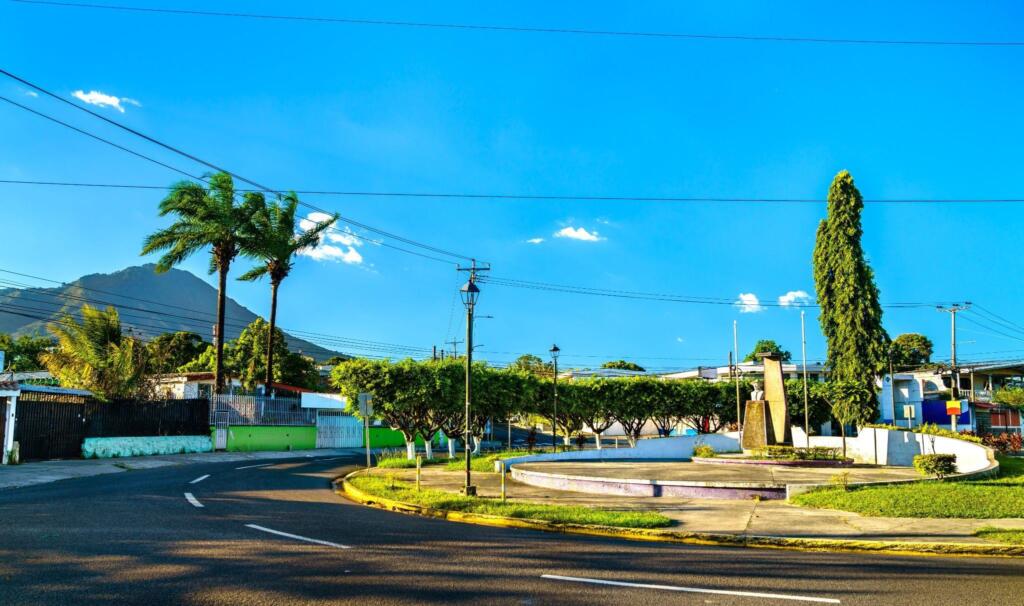
El Salvador experiences a relatively consistent climate with distinct rainy and dry seasons and moderate temperatures. The country’s tropical climate follows a wet season beginning May to October and a dry season from November to April.
However, despite its climate’s consistency, El Salvador has been marked as one of the most vulnerable countries in Latin America to climate-related disasters. Its location along the narrow part of the Central American isthmus exposes it to weather systems from both the Pacific and Caribbean/Atlantic, increasing the likelihood of extreme weather events. These factors make El Salvador particularly sensitive to the negative impacts of climate change.
San Salvador
San Salvador experiences a tropical climate with distinct wet and dry seasons. The annual weather averages reveal some interesting facts about the city’s climate.
The hottest month in San Salvador is April, with an average temperature of 25.6°C (78°F). You can visit the city at this time if you enjoy the warm weather. On the other hand, December is the city’s coldest month, with an average temperature of 23.25°C (74°F). Although this may not seem very cold, it is cooler than the rest of the year.
December also has the most daily sunshine hours, with up to 10 hours of sunshine per day. This makes it an ideal month for outdoor activities and sightseeing.
The wettest month in San Salvador is October, with an average of 206.6mm of rain. If you intend to visit during this time, be sure to pack rain gear and plan indoor activities.
If you’re looking to enjoy the sea during your trip to San Salvador, May is the best month to go swimming. The average sea temperature in May is 29.37360333°C (85°F), which is perfect for swimming and other water activities.
| Months | Jan | Feb | Mar | Apr | May | Jun | Jul | Aug | Sep | Oct | Nov | Dec |
| Average Rainfall (mm) | 3 | 0 | 8 | 44 | 153 | 150 | 126 | 137 | 141 | 207 | 36 | 4 |
| Average Rainfall Days | 22 | 20 | 22 | 21 | 9 | 7 | 12 | 9 | 9 | 8 | 9 | 20 |
| Average Temperature (°C) | 23 | 23 | 25 | 26 | 25 | 25 | 25 | 25 | 24 | 24 | 23 | 23 |
| Average Temperature (°F) | 74 | 74 | 77 | 78 | 78 | 76 | 76 | 76 | 76 | 75 | 74 | 74 |
Santa Ana, El Salvador
Santa Ana, El Salvador, experiences a tropical climate with high annual temperatures and humidity. The annual weather in Santa Ana can be divided into 2 seasons: the rainy season and the dry season.
The rainy season typically lasts from May to October, with the heaviest rains occurring in September and October. During this time, temperatures can range from 20°C to 30°C, with high humidity and frequent afternoon thunderstorms. The rainfall during this season can sometimes cause flooding and landslides in certain areas.
The dry season runs from November to April, with little to no rainfall. Temperatures during this season can range from 25°C to 35°C, with low humidity and cool evening breezes. This is the peak tourist season in Santa Ana, as visitors can enjoy the beautiful beaches and warm temperatures without the risk of rain.
| Jan | Feb | Mar | Apr | May | Jun | Jul | Aug | Sep | Oct | Nov | Dec | |
| Average Temperature | 72°F | 74°F | 76°F | 78°F | 77°F | 75°F | 75°F | 75°F | 74°F | 74°F | 73°F | 72°F |
| Rainfall (in) | 0.1″ | 0.1″ | 0.1″ | 0.6″ | 3.0″ | 5.3″ | 4.1″ | 4.7″ | 5.2″ | 3.8″ | 1.1″ | 0.2″ |
Popular Cuisines
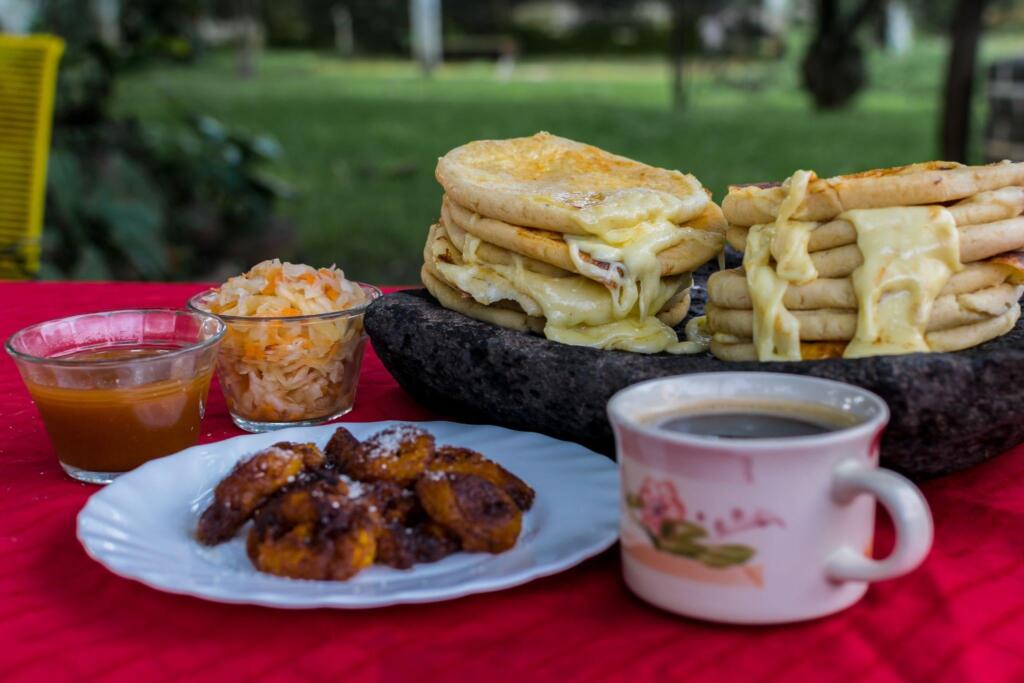
El Salvador’s cuisine is renowned for its distinct and delectable flavors, which are influenced by Spanish, indigenous, and neighboring countries culinary traditions. Let’s sample at least five popular Salvadoran dishes that you must try;
Pupusas
This dish consists of a thick, handmade corn tortilla comprising various ingredients, including cheese, beans, pork, or vegetables. The tortilla is made by mixing masa harina (corn flour) with water to form a dough, then flattened into a disc and filled with the desired ingredients before being cooked on a hot griddle. Pupusas are typically served with curtido, a tangy coleslaw made with cabbage, carrots, vinegar, and tomato-based salsa. You will find Pupusas being enjoyed by people on the streets for their delicious flavor and satisfying texture.
Yuca Frita
Yuca Frita is a popular snack made from fried cassava. It is typically served with tomato sauce or ketchup and is crispy on the outside while being soft and fluffy on the inside.
Sopa de Pata
Sopa de Pata is a nutritious soup made from cow’s feet, tripe, and vegetables. With its savory and comforting flavor, it is often touted for its healing properties. This hearty soup is a popular dish in Latin American and Caribbean cultures, where it is believed to have originated. It is often served with rice, avocado, and lime for added flavor and texture. Whether you are seeking a warm and satisfying meal or a remedy for a cold or illness, Sopa de Pata is a delicious and nutritious option that will satisfy and nourish you.
Panes con Pavo
This is a Christmas dish that consists of turkey sandwiches served on soft buns with a special sauce made from tomatoes, onions, and spices. It is a festive and filling meal relished by many during the holiday season.
Tamales
Tamales are made from masa (corn dough) filled with meat, vegetables, or cheese and wrapped in banana leaves. They are steamed and served hot and are a popular breakfast or snack item. These are common during celebrations and holidays.
Common concerns
Digital nomads on Nomad List have expressed several concerns about San Salvador city. Firstly, the roads in the city can be dangerous, which can be a significant cause of concern for those who rely on mobility to move around. Additionally, many locals don’t speak English fluently, which can create communication barriers and make it challenging to navigate the city.
Equally concerning is the city’s internet infrastructure, which is said to be very slow. Slow internet speeds can be a major challenge for remote workers who rely heavily on a fast and stable internet connection.
Some nomads who’ve been to San Salvador report that the city may not offer much to do in terms of leisure and entertainment options. If this is true, it makes the city less ideal for those who want to explore and experience new things.
Natural disasters
El Salvador is located in a region that may succumb to natural disasters, such as earthquakes, volcanic eruptions, landslides, floods, and hurricanes once in a while. As a digital nomad, you may face certain risks associated with these natural disasters, including;
Infrastructure disruption: Natural disasters can damage infrastructure, including power and communication networks, impacting your ability to work remotely.
Evacuation and relocation: In an emergency, you may need to evacuate or relocate to a safer location, which can disrupt your work and travel plans.
Health and safety risks: Such happenings can create health and safety risks, including exposure to contaminated water or dangerous debris, which can affect your well-being.
To minimize these risks, stay informed about the current situation and take necessary precautions, such as
- having an emergency plan in place
- keeping important documents and equipment in a safe place
- following any local advisories or warnings
It’s also a good idea to have travel insurance that covers natural disasters and related disruptions.
Although San Salvador and other Salvadoran cities may face certain challenges, it’s worth noting that these issues are not unique to the country. Many other nations around the world also deal with similar problems. Moreover, it’s important to consider that some of the criticisms leveled against El Salvador may be influenced by personal biases and prejudices of fellow digital nomads. Despite these challenges, the country has plenty of unique attractions, charms, and positive aspects that make it a worthwhile destination.
Always check with local country websites for the most up to date visa, health, tax and travel requirements before entering a country. This article is general information and does not constitute legal advice, check with a legal professional for visas, working visas, applicable tax and crypto laws specific to you.

